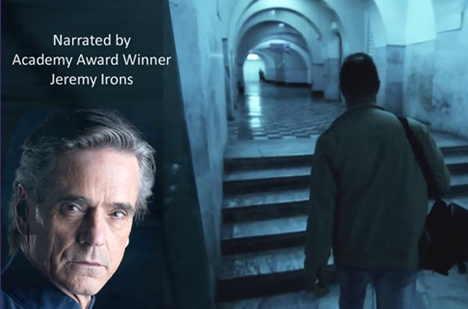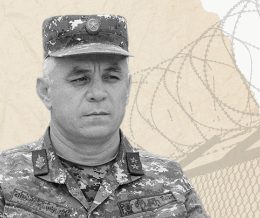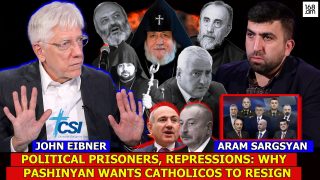
Anti-Armenian Documentary Narrated by Actor Jeremy Irons to Air in Europe

A controversial documentary about the Khojaly incident will air on Euro Channel (June 1). Directed by Lithuanian director Aleksandras Brokas and narrated by British cinema legend Jeremy Irons, ”Endless Corridor” follows Lithuanian journalist Richard Lapaitis on a trip back to Azerbaijan 20 years after he covered the Nagorno-Karabakh conflict, Horizon Weekly reported. This documentary distorts facts, alters reality, fabricates evidence and jeopardizes its own status as a documentary. Executive Producer of the documentary Gerald Rafshoon, was the White House Communications Director under the Jimmy Carter administration. The official website of the documentary is endlesscorridor.com.
Shot in English, the documentary was translated into Azerbaijani, Turkish, French, Italian, German and Arabian on the initiative of vice-president of the Heydar Aliyev Foundation Leyla Aliyeva. The film was also shown on Turkey’s “Kanal 24”, “CNN Turk”, Israel’s “Channel 1” TV channels, and Albania’s National Television.
On February 26, 1992, a series of events took place in Aghdam, which are now referred to as the “Khojaly massacre” by Azerbaijan. In reality, the village of Khojaly was one of the Azerbaijani army’s strongholds in the heart of Nagorno-Karabakh which for many months, as Human Rights Watch put it, “pounded the capital of Nagorno Karabakh, Stepanakert, and other Armenian towns and villages with shells and grenades. The indiscriminate shelling and sniper shooting killed or maimed hundreds of civilians, destroyed homes, hospitals and other objects that are not legitimate military targets, and generally terrorized the civilian population.” In this regard, suppressing the Azerbaijani army’s fire had become a matter of survival for the people of Nagorno-Karabakh.
As Azerbaijani journalist Eynulla Fatullayev stated, “And even several days prior to the attack, the Armenians had been continuously warning the population about the planned operation through loudspeakers and suggesting that the civilians abandon the town and escape from the encirclement through a humanitarian corridor. According to Khojaly refugees’ own words, they had used this corridor and, indeed, the Armenian soldiers positioned behind the corridor had not opened fire on them.”
However, Fatullayev continues, “… part of the Khojaly inhabitants had been fired upon by our own [Azerbaijani troops]… Whether it was done intentionally or not is to be determined by investigators … [They were killed] not by [some] mysterious [shooters], but by provocateurs from the National Front of Azerbaijan’s battalions … [The corpses] had been mutilated by our own …”
Ayaz Mutalibov, then the president of Azerbaijan, blamed his political opponents for the killings in Khojaly. He stated in an interview with Russia’s Nezavisimaya Gazetta in 1992 that “…the corridor, by which people could escape, had nonetheless been left by the Armenians. So, why did they have to open fire? Especially in the area around Aghdam, where there was sufficient force at that time to get help to the people. As the Khojaly inhabitants, who narrowly escaped, say, it was all organized in order to have grounds for my resignation. Some forces functioned for the effort to discredit the president.”
The fact that Khojaly inhabitants fell victim to fierce domestic political fighting for power in Azerbaijan was confirmed also by then Chairman of Azerbaijan’s Supreme Council Karayev, his successor Mamedov, Azerbaijani Human Rights Activist Yunusov, and others.
According to a 1992 report by the Azeri newspaper Bilik-Dunyasi Agency, Heydar Aliyev, then a presidential hopeful in Azerbaijan, stated, “…the bloodshed will profit us. We should not interfere in the course of events.”
Fatullayev, the Chief Editor of the Azerbaijani newspaper Realny Azerbaijan spent many years in prison for alleged defamation of the inhabitants of Khojaly. He appealed to the European court of Human Rights, which ruled that the Azerbaijani government shall immediately release Fatullayev. He was eventually released in 2011 and shortly after confirmed to Radio Liberty that he has not changed his views on the Khojaly events and that he held “Azerbaijani fighters, not Armenians, responsible for the 1992 killings” of Khojaly inhabitants.
“I call on our partner parliamentarians from different states, municipal and provincial councils to avoid the pitfalls of Azerbaijani propaganda,” Zakaryan said in his speech in parliament. “Don’t buy into false information and fictitious events. Keep clean the parliamentary agendas and don’t let the Azerbaijani propaganda penetrate there. If you are looking for those responsible for the Khojaly events, look for them in Azerbaijan.”























